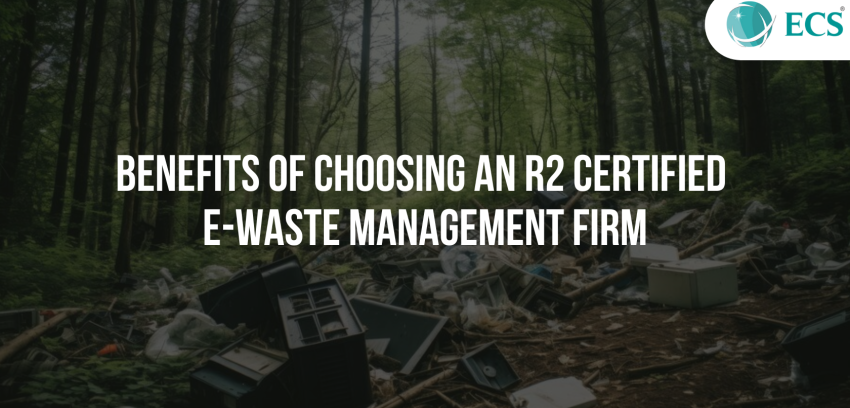Introductions
In the currently digitized world, the boom in consumption of electronics is also causing an equally swift rise in the quantity of electronic garbage, also known as e-waste. The recycling and disposition of used electronics are not only about waste management, but they also involve environmental sustainability, human wellbeing and recovery of resources. This blog examines the existing condition of e-waste disposal, new practices of recycling, possible risks, and greener approaches to them, specifically in India, while emphasizing the role of professional e-waste management services.
The World Scenario of E-Waste Production
The Global E-Waste Monitor 2024 estimated that 62 million metric tonnes of e-waste in the world in 2024, of which it has only 22 percent would be addressed through formal collection and recycling. The remaining is either disposed of in landfills or disposed of informally, which most of the time contributes to the degradation of the environment and causes health problems. The increased electronics demand rate and the not-so-long product lifetime are two key factors of such a global issue.
These situations have caused a critical demand of a strong e-waste management system in India, the third largest producer of e-waste. Nonetheless, the informal sector continues to recycle much of the e-waste in India, although regulations are in place. This makes the role of a certified e-waste management company in India even more crucial.
E-Waste Recycling Methods

1. Manual Dismantling
Dismantling of e-waste in the informal sector is done by manual handling devices. This method is unsafe and risky, although it is cost-effective, since toxic materials are released.
2. Mechanical Recycling
In India, formal companies involved in e-waste management services handling employ high-end mechanical treatment such as shredding, sorting, and recovery of the material. These techniques allow safe mining of metallic minerals such as gold, copper, and palladium.
3. Emerging Technologies
The e-waste management process is being transformed by technological advancements like AI-driven sorting systems, hydrometallurgy, and robotics that allow for increasing the recovery rates and mitigating the impact on the environment.
Environmental and Occupational Health Hazards
The mishandling of electronic waste management carries significant risks:
- Toxic Leachate: Toxic metals such as lead, mercury and cadmium leak into the ground and water and lead to long-term heavy-laden situations.
- Air Pollution: Dangerous gases, like dioxins and furans, are emitted as wires and other parts are burned.
- Occupational Risk: informal workers are not well equipped with protective equipment and therefore, when they have low risks, they develop serious problems with their health, such as respiratory problems, problems with the skin, and even cancer.
Health and environmental safety conditions that prescribe legal regulatory procedures also eliminate such risks considerably when using a clean e waste management service company.
Issues and Prospects in E-Waste Management
Challenges
- Ignorance: Most users do not know the right disposal avenues.
- Prevalence of Informal Sector: In India, nearly 90 percent of e-waste is also dealt with and managed informally.
- Poor Infrastructure: The majority of cities lack the proper e-waste management system.
- Government Regulations: The E-Waste (Management) Rules 2022 focus on Extended Producer Responsibility (EPR).
Opportunities
- Public-Private Partnerships: Partnerships will enhance the collection levels and the recycling levels.
- Increasing Demand: There is a growing interest in responsible e-waste management solutions due to increasing awareness and corporate responsibility.
Strategies for Sustainable E-Waste Management
- Legalize the Informal Sector: This is turning informal recyclers into formal recyclers by training them and certifying them.
- Increase the Number of Collection Centers: Some cities, such as Ahmedabad and Hyderabad, have introduced e-waste management in their city on an overall basis.
- Foster Producer Responsibility: Implementation of EPR laws creates a condition whereby manufacturers will be required to recover end-of-life products.
- Invest in Innovation: Supporting R&D for new Electronic waste management solutions to enhance efficiency.
- Public Education Campaigns: Encouraging responsible disposal among consumers and businesses.
Conclusion
It is through innovation, regulation, and awareness that Electronic waste management will have an ecosystem that will be sustainable in the future. Cooperation with a certified e-waste management company can substantially decrease the risks to nature and health and lead to the circular economy. Be it a household, business or governmental entity, it is always better to resort to professional e-waste management services to make the future a bit greener.
Frequently Asked Questions (FAQs)
What is E-Waste?
E-waste it is defined as the disposal of electrical or electronic equipment, such as computers, cell phones, televisions, and other equipment.
Why should it be important?
Proper electronic waste management eliminates environmental pollution and preserves natural resources and also limits health risks posed by poor ways of disposing.
What are the means of discarding e-waste in India?
You may communicate with the certified e-waste management company in India in your area or take part in the government-approved collection programs.
Are there certain services in my city?
Yes, E Waste Management Services in Ahmedabad, E Waste Management Services in Hyderabad, and E Waste Management Companies in Bangalore offer certified and safe recycling services.
Whom should an e-waste management firm serve?
They offer customs like safe gathering, information waste, secure recycling, and rule consistency.





